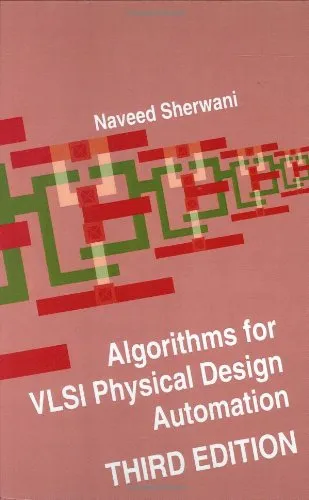Modern VLSI Design: IP-Based Design
4.0
بر اساس نظر کاربران

شما میتونید سوالاتتون در باره کتاب رو از هوش مصنوعیش بعد از ورود بپرسید
هر دانلود یا پرسش از هوش مصنوعی 2 امتیاز لازم دارد، برای بدست آوردن امتیاز رایگان، به صفحه ی راهنمای امتیازات سر بزنید و یک سری کار ارزشمند انجام بدینکتاب های مرتبط:
معرفی کتاب "Modern VLSI Design: IP-Based Design"
کتاب Modern VLSI Design: IP-Based Design نوشته Wayne Wolf، یکی از منابع برجسته و جامع در حوزه طراحی مدارهای مجتمع مقیاس بزرگ (VLSI) است. این کتاب به یک مرجع اساسی برای دانشجویان مهندسی برق و کامپیوتر، و همچنین متخصصین حرفهای در صنعت طراحی مدارهای مجتمع تبدیل شده است. در ویرایشهای مختلف این کتاب، مفاهیم بنیادین VLSI به همراه استفاده از IP-Cores و طراحی IP-Based به شکلی نوین و مبتنی بر دانش روز ارائه شدهاند.
خلاصهای جامع از کتاب
این کتاب شامل موضوعات مختلفی از طراحی مدار و فرآیندهای ترکیب و شبیهسازی گرفته تا استفاده از تکنیکهای پیشرفته در توسعه IP-Cores است. در حال حاضر، طراحی VLSI به سوی IP-Centric طراحی حرکت کرده است که این به معنای استفاده از بلوکهای قابل بازیابی (Reusable) است. Wayne Wolf در این اثر، نه تنها تاریخچه فناوری VLSI را مورد بررسی قرار میدهد، بلکه مهارتها و تکنیکهای طراحی مدرن را نیز آموزش میدهد. مخاطبان یاد میگیرند چگونه با استفاده از CAD Tools پیشرفته کار کنند، و نحوه پیادهسازی سیستمهای پیچیده را با کیفیت بالا درک نمایند.
فصول این کتاب مباحث مختلفی از جمله مدارهای دیجیتال، ساختار حافظه، معماری SoC (System on Chip) و نحوه استفاده از روشهای پیشرفته برای افزایش کارایی سیستمها را پوشش میدهند. از مهمترین خصوصیتهای این کتاب، ادغام مفاهیم آموزشی با چالشهای واقعی صنعت طراحی است.
نکات کلیدی که از کتاب خواهید آموخت
- درک اصول پایهای طراحی مدار دیجیتال در سطح بالا
- آشنایی با ابزارهای CAD برای شبیهسازی و پیادهسازی مدارهای VLSI
- نحوه استفاده از الگوهای Modern IP-Centric Design برای تسریع فرآیند طراحی
- مدیریت پیچیدگیهای مرتبط با طراحی SoC با استفاده از اصول بهینهسازی و ماژولاریت
- درک نیاز به بازطراحی و استفاده مجدد از IP Cores برای صرفهجویی در زمان و هزینه
جملات معروف از کتاب
"The essence of modern system design lies in reusability and the ability to compose a system from pre-verified components."
"VLSI design is not just about circuits, but about taking a concept and turning it into a functional reality."
چرا این کتاب اهمیت دارد؟
طراحی VLSI یکی از پیشرفتهترین حوزههای مهندسی برق و کامپیوتر در قرن بیست و یکم است. پیشرفت سریع فناوری نیمهرسانا و افزایش تقاضا برای مدارهای کوچکتر، سریعتر و قدرتمندتر، نیاز به دانش پیشرفته در این زمینه را ضروری ساخته است. کتاب Modern VLSI Design نه تنها ابزارهای مفهومی لازم را در اختیار مهندسان قرار میدهد، بلکه به آنها میآموزد چگونه از تکنیکهای مدرن استفاده کنند تا محصولات خود را به شکلی سریعتر و با کیفیت بالاتر تولید کنند. این کتاب، پلی قدرتمند میان آموزش آکادمیک و نیازهای کاربردی صنعت است.
با در نظر گرفتن تأکید روزافزون بر طراحی IP-Based و استفاده از معماریهای SoC، این کتاب میتواند یک راهنمای بینظیر برای مهندسان بالادست و بالادستی باشد که به دنبال راهحلهای استراتژیک برای چالشهای طراحی خود هستند. به همین دلیل، این اثر یک منبع کلیدی هم برای یادگیری و هم برای مرجع صنعتی محسوب میشود.
Introduction to "Modern VLSI Design: IP-Based Design"
"Modern VLSI Design: IP-Based Design" by Wayne Wolf is a cornerstone resource for engineers, researchers, and students delving into the world of Very Large Scale Integration (VLSI) design. This book bridges the theoretical aspects of the field with practical, IP-based design methodologies, guiding readers through the evolution of VLSI technology and its modern applications. Whether you are a seasoned professional aiming to stay updated with the latest advancements or a student beginning your exploration of VLSI design, this book provides an invaluable roadmap to the IP-centric design era.
Detailed Summary of the Book
The book is divided into a progression of chapters that explores VLSI design from the fundamentals to advanced concepts. It starts with an introduction to VLSI systems, discussing the transformation of hardware design from hand-crafted layouts to IP-based, automated tools. The early sections provide a strong foundation in VLSI system architecture and the design hierarchy, focusing on modularity, scalability, and reusability.
As the book progresses, Wayne Wolf delves into IP (Intellectual Property) reuse as a cornerstone for modern designs. IP blocks such as processors, network-on-chip (NoC) components, and memory units are explained in-depth. The book also incorporates the latest trends in SoC (System-on-Chip) and ASIC (Application-Specific Integrated Circuit) design methodologies, shedding light on the challenges of optimizing performance, power consumption, and area.
The final chapters extend into future-oriented topics such as emerging nanotechnology, low-power VLSI design, and 3D ICs (Integrated Circuits). Best practices for applying CAD (Computer-Aided Design) tools are well documented, with an emphasis on verification techniques and debugging of complex systems. By balancing theoretical understanding with practical insights, this book equips readers with the tools they need to excel in the ever-evolving field of VLSI design.
Key Takeaways
- Comprehensive introduction to VLSI design principles and methodologies.
- Insight into cutting-edge topics like IP-based design, SoC architectures, and NoC implementation.
- Practical examples and case studies to illustrate the application of CAD tools in real-world scenarios.
- Emphasis on low-power and high-performance design strategies.
- Discussion of future trends in VLSI design, including nanotechnology and 3D integration.
Famous Quotes from the Book
"An IP-based design approach isn't just a trend; it's the new blueprint for the VLSI industry, where reusability and modularity reign supreme."
"The challenge of VLSI design isn't just to optimize performance, but to balance power, area, and timing amidst ever-growing complexity."
Why This Book Matters
"Modern VLSI Design: IP-Based Design" is more than a textbook—it's a definitive guide that captures the intricacy and beauty of modern hardware design. The book stands out for its focus on IP reuse, a topic of paramount importance in today's IC development processes. With VLSI systems growing more complex and consumers demanding rapid innovation, this approach reduces design time, lowers costs, and enhances system reliability.
Beyond its technical depth, the book emphasizes practical understanding, making it accessible to readers with varying backgrounds. The inclusion of real-world applications, future-facing topics, and actionable insights ensures it remains relevant in an industry characterized by constant evolution. Whether you're seeking to master design concepts or understand the trends shaping next-generation hardware, this book provides the knowledge architecture required to thrive in the field of VLSI design.
Through its meticulously structured chapters and IP-focused narrative, "Modern VLSI Design: IP-Based Design" serves as both a timeless reference and a stepping stone for innovation. It is essential reading for anyone dedicated to advancing the design and technology of integrated circuits.
دانلود رایگان مستقیم
شما میتونید سوالاتتون در باره کتاب رو از هوش مصنوعیش بعد از ورود بپرسید
دسترسی به کتابها از طریق پلتفرمهای قانونی و کتابخانههای عمومی نه تنها از حقوق نویسندگان و ناشران حمایت میکند، بلکه به پایداری فرهنگ کتابخوانی نیز کمک میرساند. پیش از دانلود، لحظهای به بررسی این گزینهها فکر کنید.
این کتاب رو در پلتفرم های دیگه ببینید
WorldCat به شما کمک میکنه تا کتاب ها رو در کتابخانه های سراسر دنیا پیدا کنید
امتیازها، نظرات تخصصی و صحبت ها درباره کتاب را در Goodreads ببینید
کتابهای کمیاب یا دست دوم را در AbeBooks پیدا کنید و بخرید
1317
بازدید4.0
امتیاز0
نظر98%
رضایتنظرات:
4.0
بر اساس 0 نظر کاربران
Questions & Answers
Ask questions about this book or help others by answering
No questions yet. Be the first to ask!















